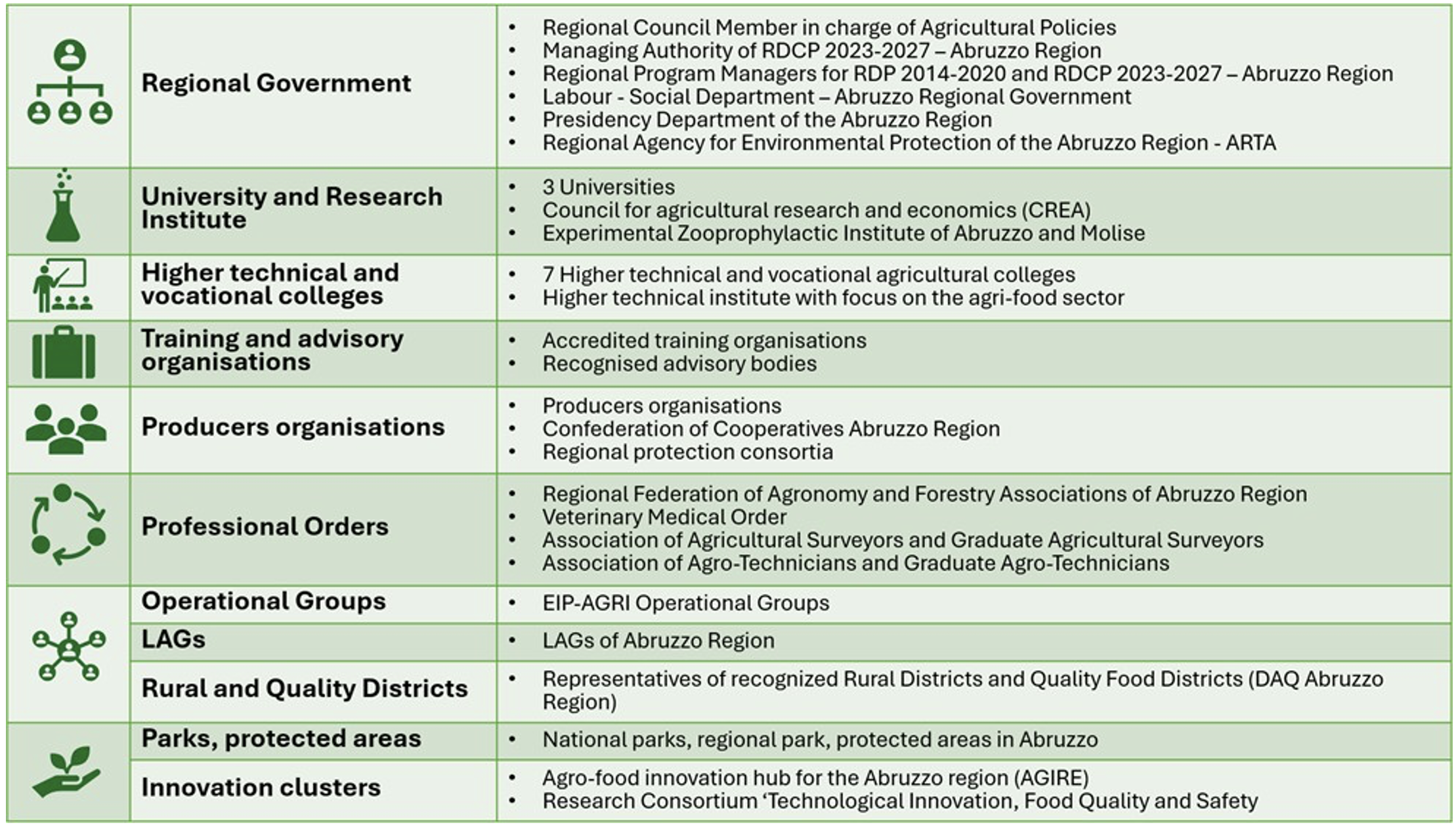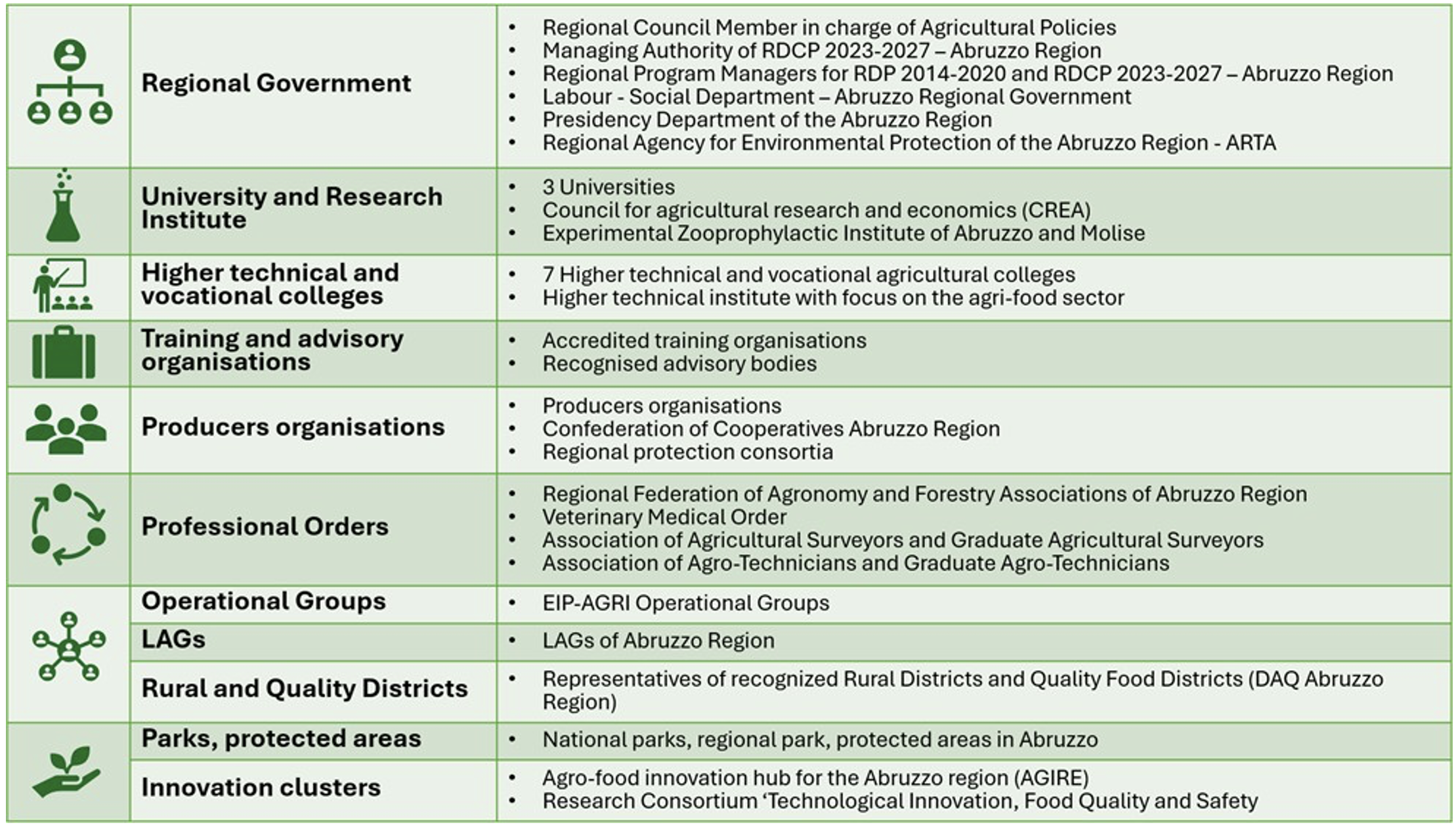2024
AKIS coordination bodies
governance

Abruzzo is among the few regions that do not have any regional bodies, agencies, foundations or experimental centres to support the agri-food sector, although significant steps have been taken in the recent period in establishing (and recognising) quality agri-food districts that, among the others, have the function to strengthen innovation services and knowledge exchange and invest in human capital. In addition, two Organic Districts have been formally recognized. Among the strengths of the Abruzzo context are the great wealth of knowledge and know-how of agricultural enterprises linked to the diversified characteristics of Italian agriculture, the presence of new professional figures to cover areas of advice (e.g. landscape architects, engineers, animators, etc.), and the greater attention devoted to AKIS since the 2014- 2020 CAP programming, which has allowed a path of progressive rapprochement and dialogue between the AKIS actors to be started, although the organisational and knowledge flows have not yet reached a good systemic arrangement. The critical elements include the weak political (national/regional) systemic strategy and the scarce availability of specific dedicated resources, as well as the lack of infrastructure (including digital) in the most peripheral and marginal areas. The regional strategy within the Rural Development Complementary Programmes (RDCP) 2023-2027 aims at enhancing the contribution that the various AKIS actors can make to achieving the objectives of the CAP, with a systemic approach to services and greater coordination in order to reduce the fragmentation of the regional AKIS actions and providing adequate support for the up-taking of innovation in favour of farms, forests and regional rural areas.
The political relevance given to the AKIS strategies in the context of the CAP Strategic Plans (CAP SP) 2023-2027 has certainly highlighted the opportunity to define governance bodies aimed at coordinating AKIS-related interventions and actors in order to better implement them and contribute to achieving the cross-cutting and specific objectives of the CAP SPs.
In particular, the AKIS coordination body is identified by the 2023-2027 SP as the contact point for the European Commission and the European CAP Network.
In Italy, as a result of the new delivery model, and differently from previous programming periods, the CAP SP 2023-2027 is established at the national level only. However, since the Regions/Autonomous Provinces have, by Constitution, the competence in agricultural matters, they have set up RDCP, which, within the framework of the CAP SP, have their own governance and implement interventions that are relevant to their specific territories.
This programming scenario implies that in Italy there is one AKIS strategy and one AKIS coordinating body at the CAP SP level (Chap. 8 of the CAP SP; General Directorate for Rural Development of the Ministry of Agriculture, Food and Forestry) and AKIS strategies and respective AKIS coordinating bodies at the level of Regions and Autonomous Provinces.
To supervise the AKIS' activities, the Abruzzo region has established a regional AKIS Coordination Body, in line with the provisions of the Italian CAP SP 2023-2027, in order to properly implement the interventions for the knowledge system, innovation and digitalisation in agriculture included in the Abruzzo RDCP 2023-2027.
The AKIS Coordination Body of the Abruzzo Region is a collective body, the ‘Regional AKIS Table’, which is composed of the regional representatives of each category of actors, who in different ways are involved in the knowledge and innovation system. It is coordinated by the Regional Government and its task is to define the organisational architecture of the regional AKIS, and to coordinate the policy design and implementation (Fig. 1).
1. Who is the AKIS CB
The Director of the Agriculture Department, acting as the Regional Managing Authority of the RDCP 2023/2027 of Abruzzo Region has provided for the establishment of a ‘Regional AKIS Table’ by requesting the regional organisations, institutions and representations body of each actor category, to formally identify their representatives and their deputies. As a result of this process, the ‘Regional Table AKIS’ was formalised, representing the AKIS Regional Coordination Body of the Abruzzo RDCP 2023/27.
The AKIS Regional Table may also be convened by the regional administration in a reduced composition, depending on the issues to be discussed and the urgency of taking decisions at administrative and management level.
2. Composition of the AKIS CB
Figure 1: Composition of the Regional AKIS Coordination Body of the Abruzzo Region 2023/27

Source: authors' elaborations based on data from D.G. Regione Abruzzo n. 706 of 25/10/2023
3. Functions attributed to the AKIS CB
The Abruzzo Region AKIS Coordination Body has the task of coordinating the design and implementation of policies for knowledge and innovation for the agrifood and forestry sector in the Abruzzo region, and in particular:
4. Procedures for interplaying with other AKIS actors and with the MA of the CAP SP
The Abruzzo Region AKIS coordination body is in charge of defining the regional AKIS strategy, coordinating the implementation of knowledge and innovation policies for the agricultural, agrifood and forestry sector for the Abruzzo Region. Moreover, it will interface with the Managing Authority of the EAFRD, ESF, and others on specific topics.
The Abruzzo Region AKIS Coordination Body has the task of defining the organisational architecture of the regional AKIS and the minimum information flows between the actors, as well as of coordinating the design and implementation of knowledge and innovation policies for the agri-food and forestry sector in the territory of the Abruzzo Region, identifying their priorities and taking care of their periodical updating.
Moreover, it links up with the Italian CAP Network, as well as with the Interregional Network of Agricultural, Forestry, Aquaculture and Fisheries Research, also to participate in specific initiatives (Technological Platforms, etc.) and to address specific needs related to research and service activities for farms and territories.
The set-up of an AKIS coordination body like this requires: